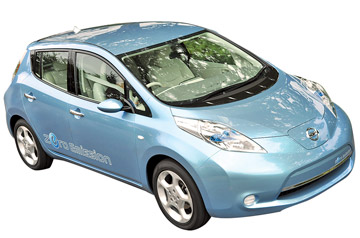Future is electric
Pramod de Silva
A couple of weeks ago, we focused on hybrid cars, which are becoming
increasingly common on our roads. But what if you give up the gasoline
engine altogether and keep only the electric battery and motor? Well,
then you have an all-electric car.
 I
have seen only variant of an electric car in Sri Lanka, called the Reva
which was made in India. It is unfortunately not being imported anymore,
but there are many electric motorcycles on our roads. It’s really simple
– you just plug in your car or motorcycle overnight and take it for your
commute the next day. You instantly cut down on the fuel bill and also
save the environment – these cars have little or no emissions. I
have seen only variant of an electric car in Sri Lanka, called the Reva
which was made in India. It is unfortunately not being imported anymore,
but there are many electric motorcycles on our roads. It’s really simple
– you just plug in your car or motorcycle overnight and take it for your
commute the next day. You instantly cut down on the fuel bill and also
save the environment – these cars have little or no emissions.
Electric cars are not new – they have been around since the early
20th Century. But they virtually disappeared when mass-produced petrol
cars became cheap. Now that fuel prices are on the rise – along with the
greenhouse gases – electric cars have found favour again. Nearly all car
manufacturers are in the fray, with Governments too granting concessions
for purchasing and using electric cars.
If this year’s ‘Detroit Motor Show’ is any indication, electric cars
will be commonplace by around 2020. Technology breakthroughs are being
reported almost every day in this exciting field.
The European Car of the Year 2010 Nissan Leaf, Tesla Roadster,
Mitsubishi iMiEV and the upcoming Ford Focus are among the prime
examples for innovative electric cars. There will be an all-electric
RAV4 by 2012. GM will unveil a plug-in Cadillac SRX as well as a
prototype designated EN-V (Electric Networked Vehicle) that can even
park itself. Mercedes has an electric SLS AMG, of all things, in the
pipeline for 2013.
But there are some challenges that have to be overcome before
electric cars go mainstream. The main limitation is (lithium ion)
battery size and driving range. There is a bit of a paradox here –
electric cars are primarily thought of as small city cars, so they do
not have space for a very big battery. The key, then, seems to be
increasing battery power and efficiency while also reducing charging
times.
The new Nissan Leaf does around 130 Km on a single charge, which is
respectable. Obviously, the goal is to drastically increase this range.
Engineers are working on new battery technologies to make that happen.
For example, Toyota is working on a magnesium-sulfur battery which will
be capable of holding twice the energy of lithium-ion cells in use
today. Auto engineers are also trying to take the heat off the battery
by having solar panels to power auxiliary devices such as the A/C and
audio/video/navigation system.
The other problem is the recharging infrastructure. If you take a
Leaf to Galle and run out of battery juice, is there a convenient way to
recharge it? At some point in the future, there will be a need for
electric ‘filling stations’ where motorists can recharge their electric
cars by paying a small fee. Oxford, UK already has such a system – the
newly commissioned 20 recharging points already recharge a fleet of MINI
Es. The car battery can now be fully charged in three hours at these 23
Amp points.
There is one other major problem with electric cars – they make no
noise. This can be deadly to other motorists and pedestrians including
deaf and blind persons. Carmakers are working on this issue, at least to
create some kind of artificially generated noise to warn others about
the presence of an electric car. US President Barack Obama has signed
into law a requirement that hybrids and electric vehicles emit noises
the blind and pedestrians can hear to avoid being struck. Nissan has
programmed the Leaf to automatically alert pedestrians when the car is
operating at low speeds. The
Chevrolet Volt has a chirping sound the driver can activate.
Electric cars have a very exciting future. We can hope to see a lot
more electric cars on our roads within the next few years and they
should indeed be very common in a decade or so once automakers iron out
the remaining problems and limitations. The glory days of electric cars
should be back, well within our lifetime.
|



